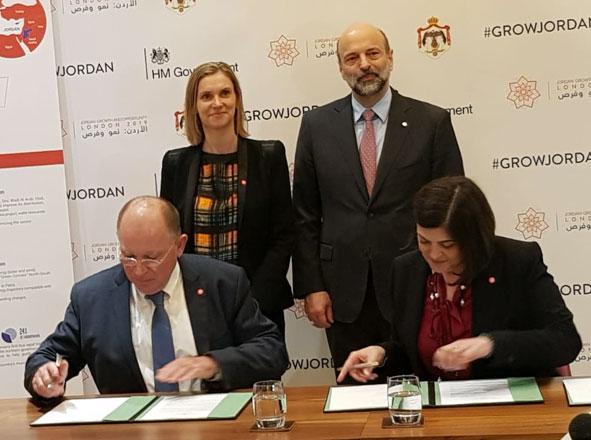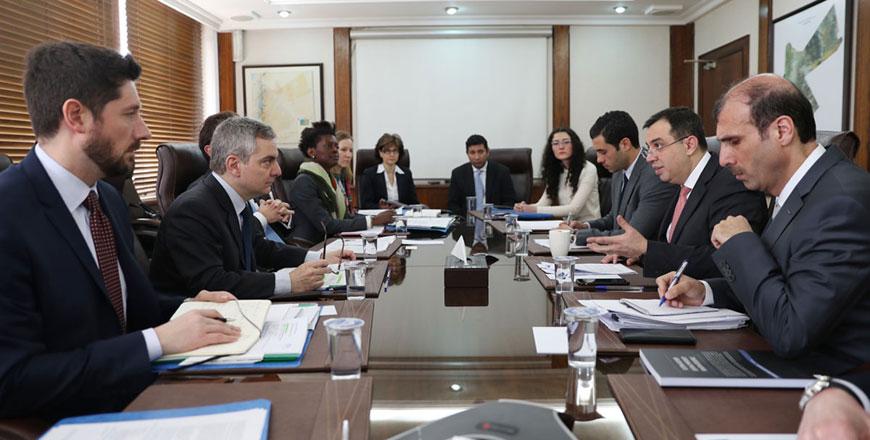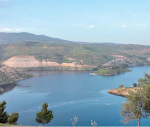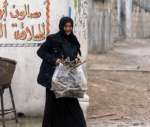You are here
Loans, grants pledged in London as countries renew support for Kingdom
By Mohammad Ghazal - Feb 28,2019 - Last updated at Feb 28,2019

Minister of Planning and International Cooperation Mary Kawar and AFD Deputy CEO Philippe Bauduin, in the presence of Prime Minister Omar Razzaz, sign a MoU in London on Thursday (Photo courtesy of AFD)
LONDON — Several countries pledged concessional loans, grants and technical assistance for Jordan on Thursday to help stimulate economic growth, create jobs in the country and help it deliver on its commitments, highly valuing Jordan’s strategic location and role in the Middle East.
As the London initiative took place on Thursday, Commissioner for European Neighbourhood Policy and Enlargement Negotiations Johannes Hahn announced that the EU will provide Jordan with 1.6 billion euros of concessional loans to enhance access to finance for small businesses over the two coming years.
The EU, he added, will also increase technical assistance to Jordan to enable it to deliver on reforms.
“The EU is aware of Jordan’s efforts and that its stability is crucial for the regional stability,” he said, adding: “We need to help Jordan face the challenges.”
Hahn stressed Jordan’s potential as an investment hub.
The Eurospean Investment Bank (EIB) said it plans to extend 870 million euros in loans and grants during 2019-2020 to support infrastructure and the development of the private sector in the Kingdom, as part of its contribution to the EU’s support.
The EIB plans to extend loans worth 800 million euros this year and the next, split between the public (200 million euros) and private sectors (600 million euros).
The remaining 70 million euros will be extend as grants for projects in a variety of sectors, including water, energy efficiency, support to SMEs, and microfinance, among others.
President of the EU Bank Werner Hoyer announced EIB’s plans in London, where the Jordanian government and the EIB signed a loan agreement of 65 million euros to finance the improvement of water supply systems in the Deir Alla and Al Karamah districts in the Jordan Valley, as well as the construction of a centralised sewage collection and treatment network in Deir Alla.
The EIB’s support is part of the bank’s Economic Resilience Initiative, designed to strengthen the EU’s southern neighbouring countries’ ability to withstand shocks.
The project will benefit from an additional investment grant of 16.3 million euros from the Economic Resilience Initiative Fund. The EIB’s finance will improve water supply and sanitation services for more than 85,000 people in the Jordan Valley and will have a positive impact on agriculture, environment, and tourism in the Jordan Valley region.
Frederica Mogherini, high representative of the union for foreign affairs and security policy said that “the partnership between the EU and Jordan is strong and solid, and the EU is engaged in supporting Jordan’s stability and its resilience”.
“With this financing agreement, we further strengthen our mutual commitment to delivering on the Partnership Priorities we agreed in 2016 and our joint determination to enhance Jordan’s social and economic development. EIB’s financing of the water supply system will benefit some of the most vulnerable groups in Jordan and have a positive environmental impact in the country,” Mogherini added.
Meanwhile, the Agence Française de Développement (AFD) signed a memorandum of understanding on the sidelines of the London initiative, renewing the AFD’s support for Jordan and committing 1 billion euros over the period 2019-2022.
The funding provided by AFD takes the form of concessional loans, both for public policy support and projects, as well as grants. It is focused on a number of sectors: water and sanitation (45 per cent), energy transition (25 per cent), urban development (24 per cent) and social cohesion (justice and youth vocational training).
The memorandum of understanding signed for the next four years reasserts these strategic and sector orientations.
German officials taking part in the event announced that Germany this year will provide 460 million euros in support for Jordan.
They stressed that Germany has been a reliable partner for Jordan and will continue its support for the Kingdom, adding that focus will be on several sectors including education, employment and SMEs.
Japanese State Minister for Foreign Affairs Masahisa Sato said Japan will continue to support Jordan with the international community.
“When King Abdullah visited Japan in November last year, the government of Japan signed a development policy loan of $300 million for three years… With regard to the first tranche portion of $100 million, based on the specific progress made in the reform efforts of the Jordanian government, we will promptly disburse without waiting for the IMF executive board,” said the Japanese official.
“Furthermore, for the second phase of $100 million, we plan to disburse as soon as the reform goals agreed between the two countries are achieved and Japan will provide additional assistance of about $430 million for Jordan,” said the minister.
Kuwait’s Finance Minister Nayef Al Hajraf stressed Kuwait’s continued support for Jordan, highly valuing the Kingdom’s fiscal reforms.
“We are committed to continued support to Jordan…. For Kuwait, Jordan’s political and economic stability is very crucial for the region… Jordan enjoys huge potential in many areas… There are challenges and needs but there are opportunities too,” Hajraf said.
For their part, Canadian officials at the event said their country will support Jordan’s efforts to increase women’s participation in the labour market.
Referring to Jordan’s action plan to increase women’s participation in the economy from 14 per cent to 25 per cent by 2025, they stressed that women participation is key to boosting Jordan’s gross domestic product.
Egypt’s Foreign Minister Sameh Shoukry said the international community needs to support Jordan though investments.
He added that investing in Jordan is “an investment in the stability of the Levant and the Middle East”.
In an address at the event, Turkish Foreign Minister Mevlut Cavusoglu stressed on Turkey’s support to the Kingdom, stressing that its prosperity is crucial.
“Jordan is facing many challenges and it needs support and burden sharing... there is huge potential in Jordan and we are currently revising the free trade agreement between the two sides,” he added.
Related Articles
AMMAN — The European Investment Bank (EIB) signed a framework loan of 260 million euros with the government of Jordan to support priority wa
AMMAN — Jordan and the European Investment Bank (EIB) on Monday discussed prospects of further cooperation in priority fields, on the backdr
AMMAN — Minister of Planning and International Cooperation ZeinaToukan on Monday signed a 400 million euro loan agreement with the European
















